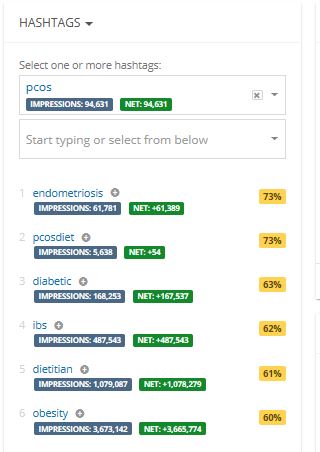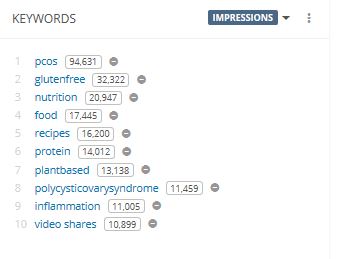
How to Find Relevant Hashtags
If you’re into social media, you know the impact that hashtags have, including the ability for relevant audiences to find your posts, and building a community of followers. The big question many people often face is, “What hashtags should I use?” While technically anything can be a hashtag, it’s important to have some data behind which hashtags you choose. There’s no sense in using dozens of hashtags that may not reach the right audience. The key here is relevancy! Are your hashtags specific and relevant, or are they random?
I was definitely guilty of using hashtags that I thought were relevant to my posts. As a health coach and polycystic ovary syndrome (PCOS) blogger, I tend to focus my hashtags around those categories. I always found it tough to research which hashtags people were following, and wondered if there were more effective ones out there.
I recently started using Social Analytics from Northern Light, and it has opened my eyes to a whole new meaning behind hashtags. Northern Light helps identify the most impactful terms to incorporate into my Twitter and Instagram posts. The best part about this tool is it uses machine learning to inform its analysis.
Social Analytics can help answer questions such as:
- What hashtags should you use in your own social media posts?
- What Twitter keywords should you buy advertising against?
- What sentiments resonate with your customers that you might use in advertising copy?
- Which influencers should you make sure understand your story?
My Experience with Social Analytics
I used the Social Analytics tool to find relevant hashtags and keywords for my wellness Instagram account. My blog and Instagram both focus on wellness; specifically sharing PCOS content. The goal of my posts is to reach people who have PCOS or a similar health issue, and to provide them with valuable content relating to this disorder. What amazed me was how by plugging in “PCOS” as the hashtag, Social Analytics showed me a list of relevant hashtags and keywords around that search. This was helpful to me, because these were hashtags I wouldn’t think to search for myself. For example, “PCOS Diet” is 73% semantically similar – such a game changer for my food posts! One hashtag that amazed me, and really proved the science behind this tool, was #IBS. I would never think to include this hashtag, but it makes total sense because a lot of women who have PCOS also struggle with IBS (irritable bowel syndrome) symptoms.
Here are examples of other hashtags that were relevant to my “PCOS” search.

Keywords
Aside from the hashtags, I found the keywords section to be just as helpful. As you can see below, gluten-free, nutrition, and inflammation are listed. Just like the “IBS” hashtag, this was another fascinating search for me! It made complete sense why people would also be searching for these phrases. Following a gluten-free diet is beneficial for women with PCOS, and focusing on nutrition is important to prevent inflammation. This helped me realize that people are not only searching for broad PCOS tips, but they’re searching for more specific tips, like gluten-free recipe ideas, or posts that talk about how to reduce inflammation.

As you can see, hashtags are beneficial for social media marketing, but the first and most important step is to use relevant and specific hashtags. I would recommend Northern Light Social Analytics to any social media marketer who is looking to increase engagement, build a brand, and help your target audience find your posts.
by Lauren Greenberg
Lauren is a certified health coach, helping women looking to better themselves in terms of physical and mental health. Starting with teaching healthy eating habits, all the way down to addressing emotional triggers. Find Lauren online at sofreshsocleanbylg.com and on Instagram at @sofreshsocleanby_lg.